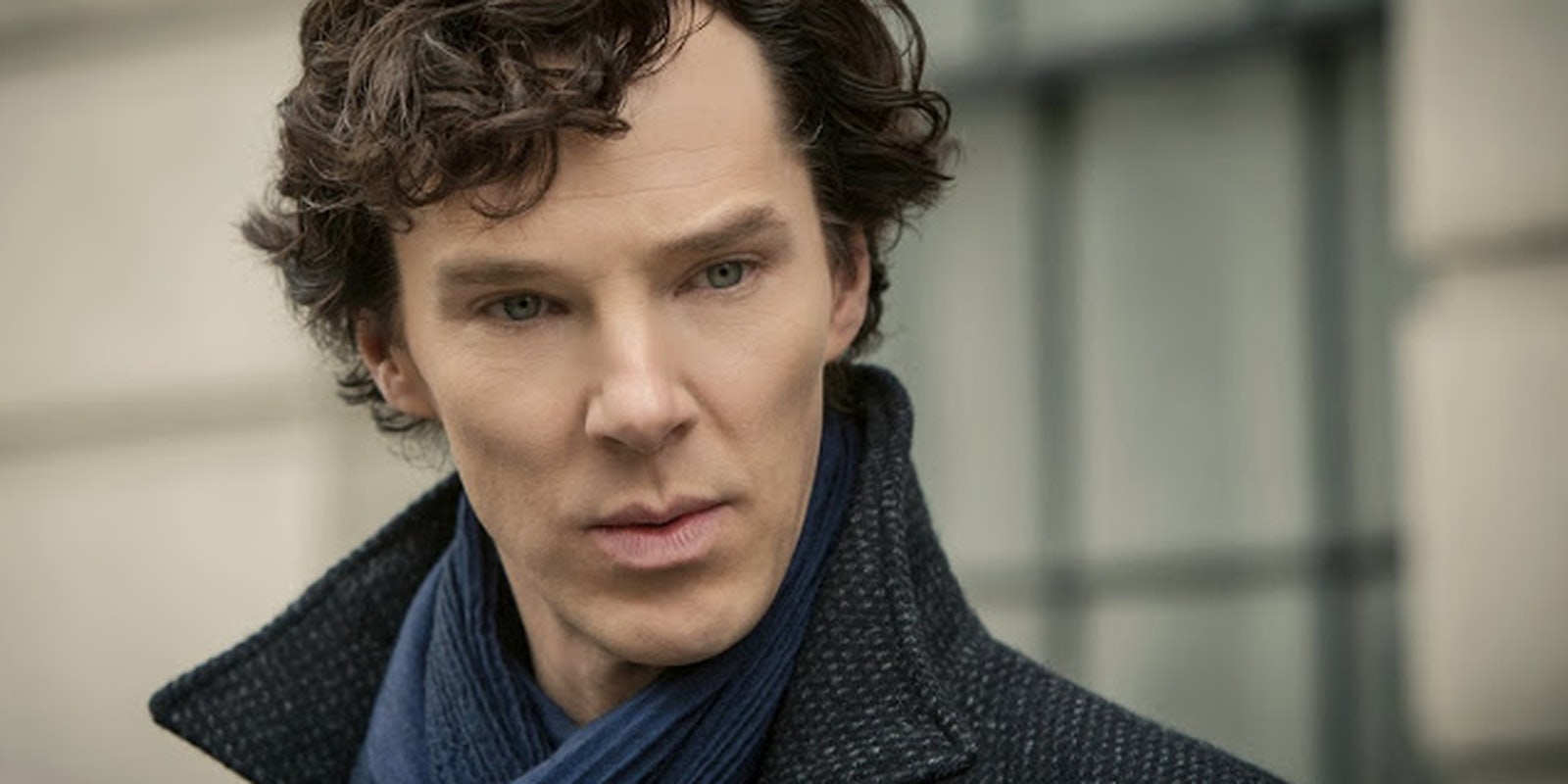It’s only the second day of the year, but the question of what the most highly anticipated show of 2014 will be has already been answered. When last night’s episode of BBC’s Sherlock landed, it was to millions of giddy, eager fans who’d been waiting for new episodes for two full years. Expectations were impossibly high, as was the fan response: 10 million viewers tuned in to the BBC to find out how Sherlock survived his fall from the Reichenbach tower at the end of Series 2, and what John’s reaction would be to discovering that he was alive after all this time.
What happens when you force two Sherlock fans (who are also reporters) to wait for two years for the next installment of their show, then ask them to have a conversation about the latest episode? Lots of feelings, basically. But, since this is a Steven Moffat production we’re talking about, there’s also plenty of controversy. Read on as the Daily Dot’s resident fandom reporters, Aja Romano and Gavia Baker-Whitelaw, take on the funny hat detective and the Fandom That Waited.
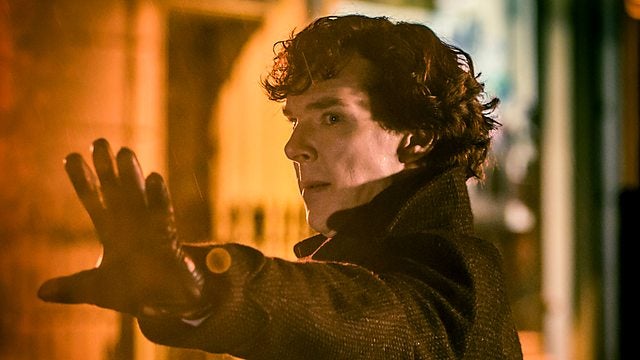
Gav: It probably would’ve been better for the purposes of this review if one of us had seriously hated this episode, but in fact I rather enjoyed it. Just not, you know, as much as Aja did.
Aja: That’s okay! I have no doubt that in three weeks we’ll both be flaming ash-heaps of Moffat-induced rage.
Gav: But you loved last night’s ep.
Aja: Well, to be fair, I love Sherlock most when it’s ridiculous, and Sherlock’s superpower is to leap so far over the top of the nearest shark that most critics just forget the shark is there and devolve into helpless fan glee. Watching Brigadier Cuddlywumpus swan around with his coat and his scarf and his “Jawn” is like going on some kind of Willy Wonka-induced acid trip complete with radioactive green bunnies and mind palaces. “The Empty Hearse” grabbed us by the hand and plunged us into a sea of Cumbersmirks, dizzy edits, lascivious winks to two years’ worth of fan theories about how Sherlock survived his fall, and oh my god was that a headbutt?
Just when you thought things couldn’t get more outlandish than stodgy, Javert-ish Anderson warping into full-on conspiracy theory fanboy during Sherlock’s absence, writer and co-creator Mark Gatiss delivered something extra zany, like Sherlock posing as a terrible Clouseau-ish French waiter, or Sherlock and Mary vrooming up staircases on motorcycles in full-on Jason Bourne-level suspension of disbelief.
Gav: Sherlock has always been an unabashedly silly adaptation of a series of melodramatic Victorian crime stories that didn’t make a huge amount of sense in the first place, so a few casual plot holes are not a major concern for me. Of course, there are inevitably a handful of minor details in the “Empty Hearse” storyline that are sheer nonsense, but I doubt most viewers really care about that. I’ve always thought that one of the weirdest things in Sherlock fandom is the idea that anyone, ANYONE, thinks this show is a serious drama. I mean, Moriarty stealing the Crown Jewels. Sherlock’s drawn-on moustache. THE WHOLE OF THE BASKERVILLE GHOST HOUND EPISODE.
Aja: First hallucinogenic dogs and RADIOACTIVE GREEN BUNNIES, and now the bewitching of an entire transit authority: Gatiss’ plot twists resemble nothing so much as a kind of tongue-in-cheek urban fantasy. And I love it.
But I also love fandom most in moments of collective mass euphoria, and rarely has a fandom exhaled its bated breath on such a sustained squeal of joy as the Sherlock fandom did last night.
Gav: I first saw “The Empty Hearse” a couple of weeks ago at a preview screening, meaning that I’ve had more time to get over the initial honeymoon period that you’re evidently still in. Since then I’ve come to realise that while this episode was really entertaining from a fandom perspective (I’m a nerd so I loved the whole Giant Rat of Sumatra thing), it had its flaws.
Aja: I definitely recognized the flaws. But I was enthralled with the fanservice. In an episode that packed in Guy Fawkes Day terrorist plots, faux mummies, and disappearing railway cars, we also got moments of blatant, unapologetic fanservice: multiple references to Sherlock slash ships, a scene of the two most brilliant men in Britain annoying each other like third-graders over a game of Operation, and an absolutely amazing meta-reference to the fandom meme of Martin Freeman being a hedgehog. (We won’t spoil you, but for Sherlock fans who haven’t yet made the connection, we’ve got you covered.)
I thought the fanservice was what made “The Empty Hearse” phenomenal—and I don’t normally say that because fanservice usually feels exploitative. But for the most part, last night’s episode felt to me as if Gatiss spent months gorging himself on Sherlock fandom theories. Then he sat down and wrote an episode that responded to everything, incorporated everything, and—problematic elements aside—had something for everyone. It even opened with a gratuitous shot of Cumberbatch, shirtless and posed like a Christ figure, bearing the weight of two years of fandom expectations on his tawny chiseled shoulders.
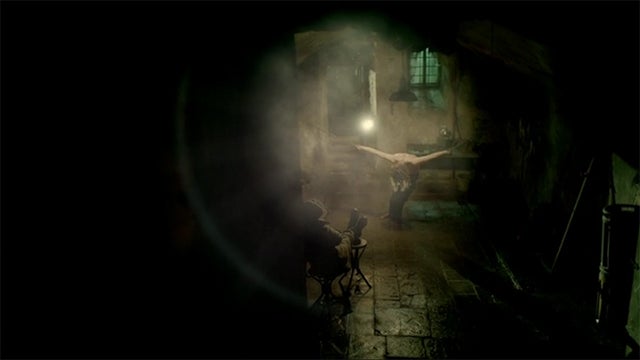
Gav: His pasty white shoulders. Not only is the core cast of “The Empty Hearse” entirely made up of white English people, but there were no people of color with a meaningful speaking role, at all. Like, ANYWHERE. It was even worse than the Doctor Who Christmas special in that regard.
Aja: Yup. Like all epic acid trips, Sherlock has a nasty crash: a painful reckoning with a dismissive, heteronormative, white male narrative without any hint of progressive representation or characterization in sight. If you’re unfortunate enough to have lived through the show’s Orientalist and inexcusable second episode, “The Blind Banker,” you got to experience the high and the crash simultaneously.
Gav: Most fans agree that “The Blind Banker” the worst episode of Sherlock so far, featuring a whole host of bizarre racist stereotypes relating to its storyline about Chinese smugglers. That episode was criticised so harshly that I doubt the writers will make the same mistake again, but The Empty Hearse presented us with a more insidious problem: whitewashing. Basically, this new episode took place in some kind of alternate universe version of London—
Aja: I’m telling you, urban fantasy!
Gav: —where people of color are only distantly visible behind the extended cast of white people having important conversations in the foreground.
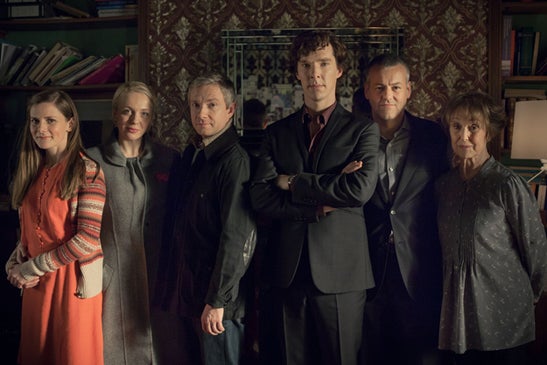
And I suspect that once fandom has gotten over its first flush of love for the superficially entertaining aspects of “The Empty Hearse,” more people will begin to pick up on this issue. (Also, “an AU of London where everyone is white” is like the worst urban fantasy concept ever.)
Aja: I don’t think it’s an issue of realization. (Also, if you think whitewashing fantasy isn’t a problem, you should probably steer clear of your nearest YA bookshelf!)
No, if Sherlock has driven one point relentlessly home since its inception, it’s that Steven Moffat has no interest in representing a diversified London, or really an interest in anything outside of dudes and what women can do for them. Even the amazing Amanda Abbington as Mary was summed up succinctly in her introductory scene as “the best thing that ever happened to” John, because women on Sherlock are only there to happen to Sherlock and John, or be useful to them when called upon.
And the show’s token attempt to give Molly Hooper narrative closure turned out to be an ultimate joke at her own expense.
Gav: Yes! I was kind of surprised to discover this back in the days of the first season, but Sherlock fans really do seem to love Molly. I think that’s mostly thanks to actress Louise Brealey, who manages to elevate the character beyond being a one-note joke about a nerdy girl who is obsessively and very obviously in love with Sherlock. In the new episode, it seems that she’s finally moved on from her hopeless crush, and gets some closure when she admits that she wouldn’t feel able to replace John as Sherlock’s partner. So far, so good. But then in the final scenes, we learn that her new boyfriend is a carbon copy of Sherlock, which seemingly reduces all of Molly’s earlier character development to a single punchline about her still being in denial.
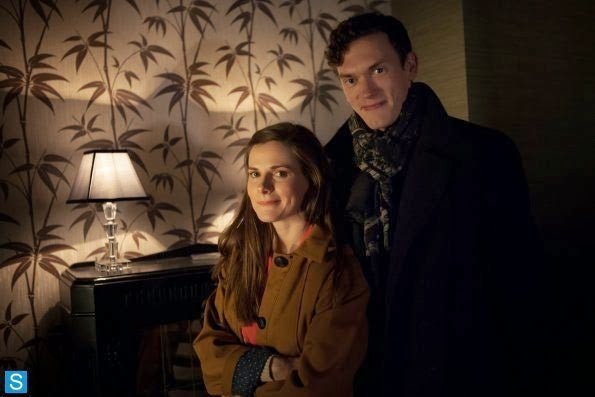
Aja: Yep. Also, POC Detective Sally Donovan was absent. Instead, her partner in skepticism, Anderson, was allowed to become the male metatron for a heavily female Sherlock fandom.
Gav: In the first two seasons Donovan was Sherlock’s harshest critic, with Anderson backing her up as a kind of sidekick. Now, Anderson has been given this way more significant and sympathetic role while Donovan’s absence isn’t even explained. I noticed that some industrious fans have already discovered that the actress portraying Donovan may have been unavailable to film “The Empty Hearse,” but that only explains things from a practical, real-world standpoint. I think it’s still a good idea to think critically about Anderson’s new role as Sherlock’s biggest stalker-fan, particularly since they picked him to be the dweeby, unshaven mouthpiece of a fandom whose most vocal members are mostly women.
Anderson’s guilt over Sherlock’s apparent suicide drove him to dedicate all his free time to conspiracy theories about how Sherlock might have survived. I loved this character progression because it was so unexpected but still totally plausible. However, looking at his new role from a wider perspective of the show as a whole, this is a concept we’ve seen multiple times already. Sherlock himself is an arrogant, unlikeable man who is eventually proven right against all odds… but so, in some ways, are Mycroft, Moriarty, and now Anderson. He’s the beta-male fanboy counterpart of all the arrogant antiheroic geniuses we’ve already seen on the show.
One of my least favorite things about Sherlock as a Holmes adaptation has always been how unpleasant Sherlock is as a person. TV is already littered with genius antihero dudes, but after a few seasons they usually do have to learn something from their mistakes, or at least be punished in some way when they finally go over the line. Even the pill-popping and needlessly cruel antihero of House, MD (yet another modern Holmes adaptation) got his comeuppance from time to time, but Sherlock never changes or evolves at all.
Aja: To be fair to the show, I think Gatiss (I’m a Gatiss fan if that’s not totes obvious yet) really did try to show Sherlock’s evolution. I think the larger point of the scenes between Sherlock and Mycroft was to demonstrate what Sherlock has learned from John that Mycroft lacks due to his own self-imposed isolation. Sherlock’s scenes with Molly, too, demonstrated an empathy he hasn’t shown us earlier. After all, would Series 2 Sherlock have hesitated to point out to Molly that she’d traded him in for his double? I don’t think so. So, too, the themes of aloneness in this episode, and his awareness of his inability to understand humanity in his conversations with Mary, ironically demonstrated a more pliant understanding of humanity than we’ve yet seen from Sherlock. It’s clear that his time away from London (and presumably civilization) has left him with a greater appreciation of his friends and the community that he built and then destroyed.
But all of this ultimately feels hollow, like a gimmick—in part because it’s growth that feels superimposed on a morally rigid character, and in part because he absolutely undermines it all at the end with his scene in the railway car with John. It leaves you feeling as though Sherlock has faked not just his momentary bout of tears but his entire attempt at being less sociopathic and demonstrating empathy. It’s one of Sherlock’s—and Gatiss’s—cruelest disguises, because we’re left like John, tugging on beards, unsure of what’s real.
Gav: Sherlock is often at his most entertaining when he’s being socially maladjusted and rude, and I won’t deny that this episode was funny as hell. But once the first flush of hilarity had worn off after watching “The Empty Hearse,” I began to think about just how abusive the John/Sherlock relationship really is. Even when John thinks he is about to die, Sherlock is still manipulating him and laughing at his pain. Somehow, this no longer seems to balance out against all the times Sherlock saved his life or proved that he trusted John after all.
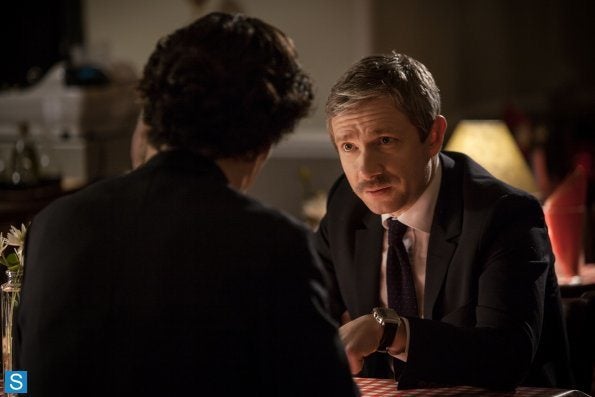
Aja: Don’t forget that queer fans and supporters also got shafted when it came to the John/Sherlock interactions: when the episode wasn’t queerbaiting John/Sherlock shippers by hinting at the pairing and simultaneously issuing ‘NO HOMO’ denials, it was mocking Sherlock/Moriarty shippers with yet more denial and an almost-kiss played for laughs.
We’ve both written endlessly about how problematic queerbaiting is, so I don’t think we need to spend a lot of time on it. If you google “queerbaiting” one of the auto-populated suggestions is “Sherlock.” I think that speaks for itself. Basically, if you want diversity, strong women, and nuanced queer and genderqueer identity, you want a show that is not Sherlock. To put it bluntly, you want Elementary.
Gav: Yeah. I found it difficult to put Elementary out of my mind when watching this episode — although I don’t want to start a debate over which Holmes adaptation is “better” because they each have their own strengths and flaws. Elementary will never be a 90-minute thriller with so many snappy one-liners and double-takes that you sometimes have to rewind and rewatch because you were laughing so hard. Then again, Sherlock has never displayed anything that even approaches the emotional complexity and maturity of Elementary, not to mention its unusually diverse cast.
After having two years to become acclimatised to Elementary’s realistic level of racial diversity, this episode just seemed to highlight just how odd and uncomfortable it is to film a feature-length crime drama all over London and have every single character be white. An episode set in the Conservative Party conference would still require a more diverse cast than what we saw in “The Empty Hearse,” which takes place all over London at various times of day and night. Also, Sherlock already has some decidedly dodgy history with the way it portrays non-white characters, particularly in “The Blind Banker.”
The one other comparison I have to make is between the Holmes/Watson relationships in each show. Elementary’s Joan Watson and Sherlock Holmes have changed a great deal in the year and a half they’ve been together, learning each other’s foibles and actively working to strengthen their relationship in a mature and intelligent way. John and Sherlock, on the other hand, are far more antagonistic. There’s no denying that their partnership is intense to the point of symbiosis, but it relies upon John tolerating Sherlock’s unbearable behaviour, which in this episode was more unbearable than ever.
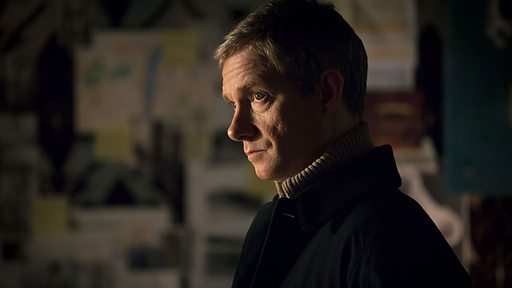
Sherlock was always kind of a dick, but this time the circumstances surrounding his dickishness had escalated. Not only did he fake his death for two years without informing his best friend, but he then compounded the insult by refusing to apologise or explain. After just a few weeks of living with Joan, Elementary‘s version of Holmes had already learned how to be more considerate to those around him, but Cumberbatch’s Sherlock has barely matured at all in three years.
Aja: In other words, you could almost say that just as Steven Moffat has refused to take to heart anything that Doctor Who and Sherlock fans have had to say about allowing his shows to be more diverse / give women more agency, so Sherlock has failed to learn anything or really grow as a character during his three years as London’s only consulting detective.
But frankly, after having seen what Sherlock at its worst can be—a misogynist, racist, homophobic shitshow—I’m just relieved and glad it didn’t attempt to actively draw Sally Donovan into the episode given its penchant for demonizing her, or do more than just undermine Molly Hooper’s choices for herself.
Gav: Basically what you’re saying is: Lower your standards, haha.
Aja: Well, really, just don’t expect Sherlock to be what it clearly has no intention of being. It’s the only possible way to enjoy it. I realized that’s a privileged point of view, and it’s not an ideal state—to be grateful that, hey, this narrative that you expected to punch you in the gut actually only knocked you about the ears a little!
I think we’re in mutual agreement that Sherlock is not a great show, though I frankly like it best when it’s overtly ludicrous. But last night I was mainly besotted with the extent to which it is clearly a labor of love: self-congratulatory, mansplaining love, possibly, but a sincere attempt to encompass and respond to a wealth of fan expectations nonetheless. The level of engagement with the fandom revealed the creators’ sheer affection for their fans, or perhaps their sheer hubris, or both—in any case, a microcosm of the things we love about Sherlock himself.
So I watched it again. Gosh this episode makes me so happy. It made me feel like they actually care about the fandom. <3 Mark Gatiss
— Liz (@her_nerdiness) January 2, 2014
Ultimately, it made me happy, too. As Sherlock donned his seersucker once more, I felt the sense of validation and appreciation that comes from seeing fans be heard. Yes, the acting was superb, the Johnlock reunion was satisfying, and the Sherlockian antics were as preposterous as I’d hoped. But on top of all that, it was exhilarating to know that all that collective fandom energy and spirit, even the kind that results in silly memes, is being acknowledged and listened to.
And if Moffat and company are practicing selective hearing when it comes to the subjects of diversity, queer representation, and female agency—at least we know they have their ears on. This will most likely be the last season of Sherlock. I have great hopes it will also be the one in which the voice of its fandom reverberates the loudest.
Gav: I wish I had your optimism. I found this episode entertaining and I do actually think Sherlock is a great show as a whole, but also… we’ve been burned before. Admittedly the sample size is very small, but the previous two seasons were incredibly patchy. You’d get one incredible episode that’s like a Jason Bourne movie with added slapstick comedy, and then the next week you’d end up with some bizarre mess of golems and Chinese acrobat gangsters and mutant bunny rabbits and weird misogynist subplots.
Aja: Don’t forget the taunting of PTSD-sufferers and the idea that it’s totally okay to drug your bestie and send him into a life-threatening situation without his knowledge or consent! Sighhhhhh.
Gav: I guess what I’m saying is: I can’t face raising my hopes that high. So for the next (and last?) two episodes, I have some pretty simple desires: for Sherlock to apologise and treat John with a little more respect, and for Mary to not end up dead in a ditch. Realistic goals, I hope.
Aja: Right. Honestly, I’ll be happy if it just continues to avoid the extreme offenses of previous seasons. To quote Sondheim, if you have no expectations, you can never have a disappointment. I watched with zero expectations, so “Empty Hearse” won my enjoyment.
All photos via BBC Sherlock

